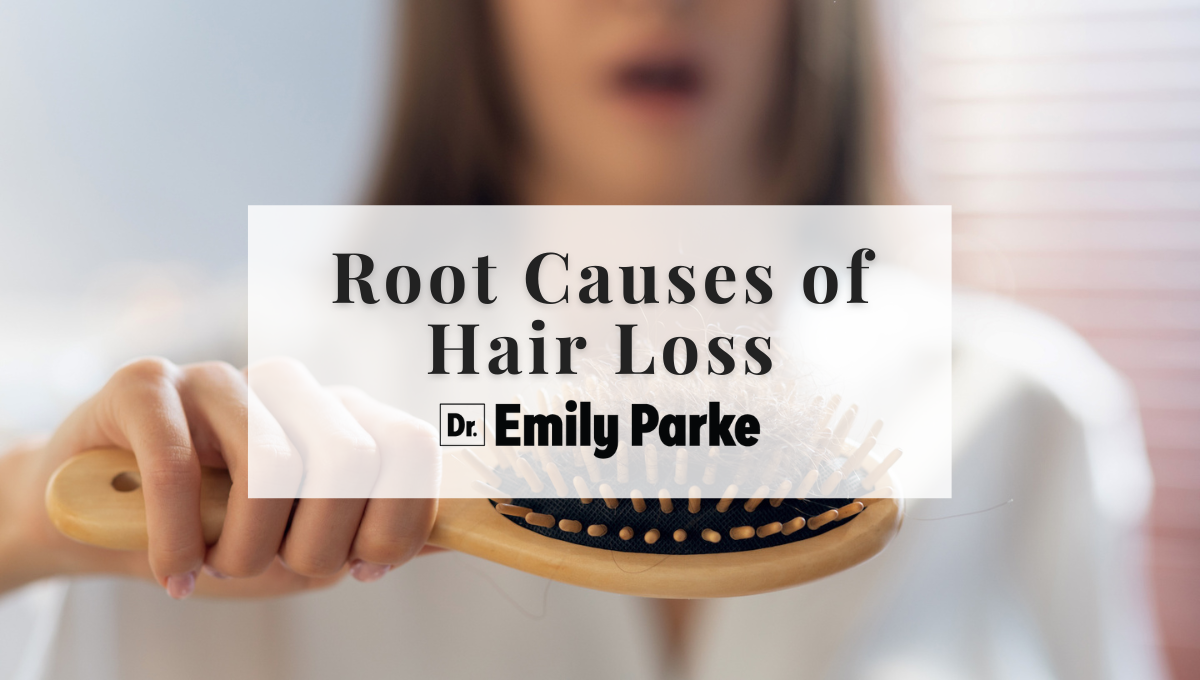

Hi, this is Dr. Emily Parke with your Next Functional Health Minute. I’m going to take a few minutes to talk about the many root causes of hair loss. It is not simple most of the time. There’s a few different categories we want to look at. One is hormones and that’s adrenal, thyroid, and sex hormones. The other is nutrient deficiencies. We also want to look at toxins and we also want to look at genetics, and then there are some autoimmune diseases that can contribute to hair loss.
Hormones
So if we back up and talk about hormones, we’re looking at adrenal, thyroid, and sex hormones. So we’re looking at the effect of stress on hair loss and we’re looking at the effect of thyroid hormone levels and even thyroid autoimmunity on hair loss. And we’re looking at the male and female sex hormones, which tend to be one of the most popular things everyone thinks about when you talk about hair loss, because it’s very common for women to experience postpartum hair loss, of course after they’ve had their baby and that’s due to giant shifts in hormones very quickly. It’s also common for males as they age to experience hair loss. And some of that might be genetic, but what can happen is the conversion of testosterone into something called dihydrotestosterone can be excessive and that can contribute to things like male pattern baldness and also prostate disease as well. And some of these things are really easily remedied. For example, the dihydrotestosterone metabolism I was talking about, a lot of times something as simple as saw palmetto can help with those symptoms.
Nutrient Deficiencies
So nutrient deficiencies are another huge category. Zinc and iron have to be the top two that I see contribute to hair loss, but there can be some other micronutrients, for example, like biotin, that can contribute as well. That’s one of the reasons why, when you look at a lot of hair, skin, and nail products, they all have some biotin in it. But I will say if that’s not your root cause, then taking tons of excess biotin is not likely going to help with hair regrowth.
Toxins
Then there’s a huge category of toxins and that’s toxins in two ways, let’s say. That’s environmental toxins that you’re exposed to. And also I would say topical toxins. And that may be including chemicals that are in your shampoo and conditioner, your hair styling products. And then there’s also other things related to how you style your hair, excessive heat, how you brush your hair that can contribute a little bit to hair loss as well.
Genetics
And then genetics of course plays a role. You want to look at the family history of hair loss. When did it start to occur in family members? Which family members have it? That can give you an idea of what your future might look like. Not to say that there aren’t things you can’t do to optimize your hair loss. But to summarize big categories, hormones, nutrients, toxins, genetics, those are the big ones. And you do want to see a functional medicine provider to get all of those evaluated to figure out what your specific root causes are before just trying to treat on your own. This is Dr. Emily Parke with your Next Functional Health Minute.
Share:
Dr. Emily Parke
Social Media
Most Popular Posts
Subscribe To Our Newsletter
Related Posts

How Fructose Intake Affects Metabolic Health: What You Need to Know
Fructose, found naturally in fruits and added to processed foods as high fructose corn syrup, impacts health. Learn the metabolic effects of fructose intake.

Get More Vitamin D for Better Health!
Of all the vitamins and minerals you should be sure you’re getting enough of, vitamin D is perhaps one of the most important. The benefits of vitamin D are widespread and pretty incredible.

The Science Behind Protein: The Optimal Amount of Protein in the Diet Based on Age and Activity Level
Different amounts of protein are needed at different stages of life. Learn about protein, how much you need, and what happens when you don’t get enough.

Magnesium: The Essential Mineral, Its Role in the Body, and What to Know About Magnesium Supplements
Learn about the mineral magnesium, its role in the body, how to spot magnesium deficiency, and the most bioavailable forms of magnesium to supplement with.
